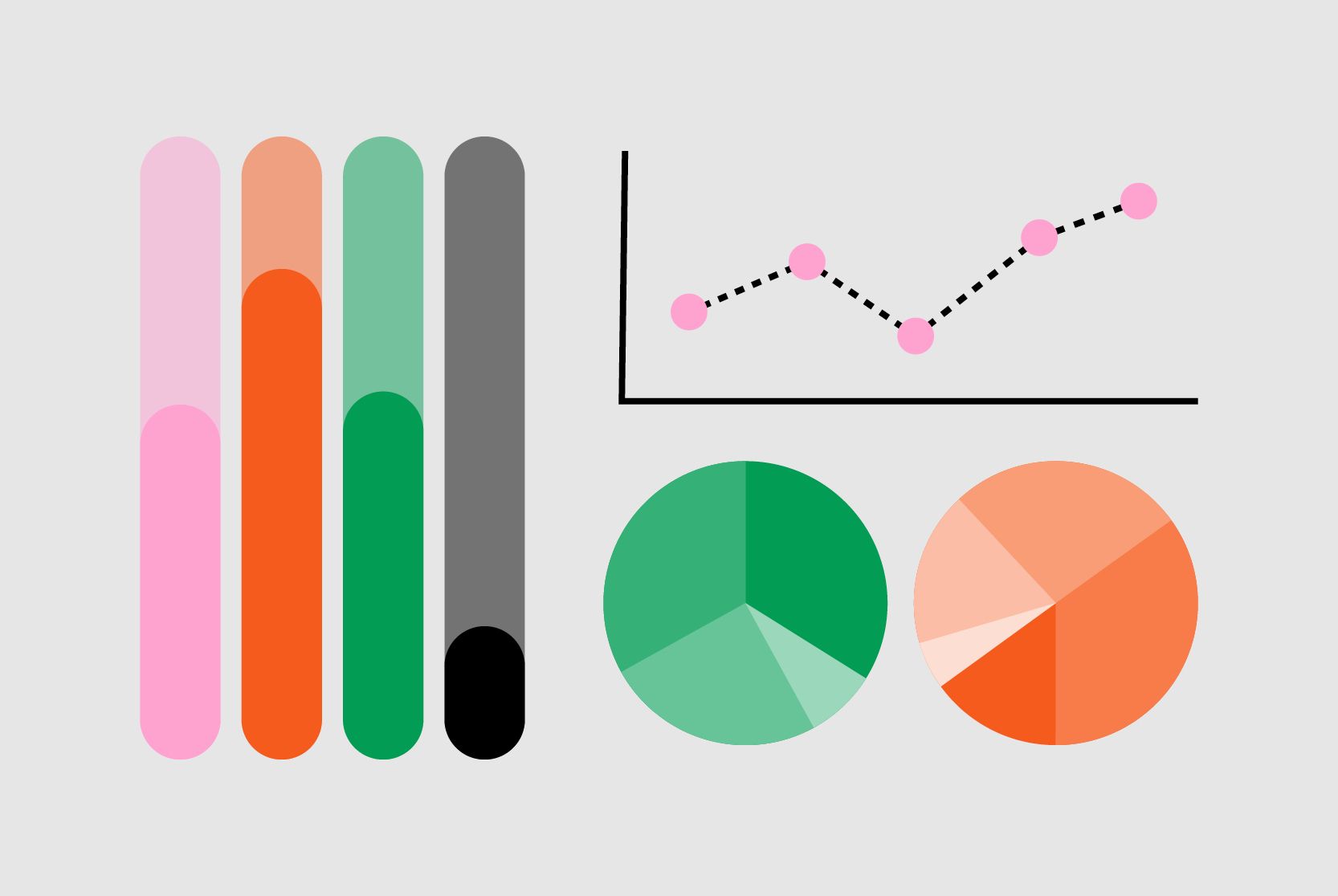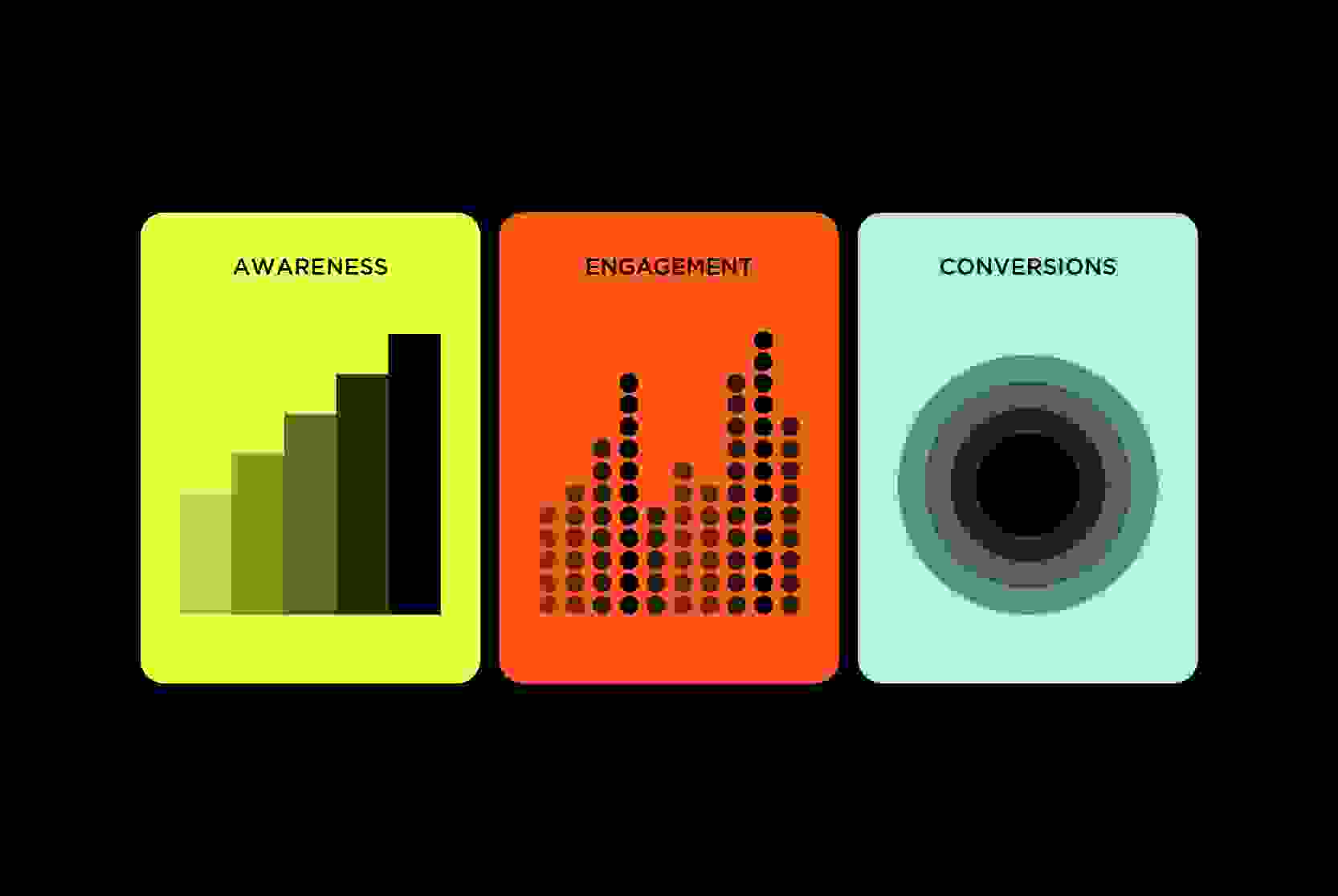Using website and social media metrics to improve your marketing efforts

Regular analysis of your website and social media performance is a great way to understand the effectiveness of your digital marketing activities, empowering you to make informed business decisions backed up by data and insights.
Assessing different performance and engagement metrics will enable you to formulate a marketing strategy that leverages your digital marketing efforts alongside your overarching business goals and objectives, generating meaningful insights for targeted growth and success.
Getting started: using website and social media metrics in your marketing strategy
Before creating your marketing strategy, you should first outline your marketing goals and objectives. What does your business want to achieve in the short and long term?
When defining your marketing goals, you should be as specific as possible while avoiding overcomplicating things. Is your business struggling with user engagement? Do you want to generate more leads? You can use these questions to inform the development of your marketing goals.
Remember, your marketing goals can be tied to different stages of the customer journey and will change as your business evolves. Let's say you feel like you’ve solved the issue that you were having with engagement, and now you want to start converting leads into paying customers; it would make perfect sense to alter your goals to accommodate this.
Choose website and social media KPIs that align with your business goals
Once you’ve identified your marketing goals, you can start delving deeper into which website and social media metrics you want to track, setting targets for these specific metrics that will enable you to effectively measure the success of your marketing efforts.
Your KPIs should be specific, measurable, attainable, relevant, and time-bound (SMART). Here are some examples of how you can convert your marketing goals into measurable website and social media KPIs.

Goal 1: Increasing brand awareness
Brand awareness is important for almost every business. You might have an amazing product or service, but without any sort of awareness amongst your intended audience, you aren’t going to make many sales.
Although brand awareness is quite hard to quantify, we can measure this using website and social media KPIs like website traffic, time on site, post reach, sessions per user, search volume, and organic impressions. An increase across these awareness metrics would suggest that your marketing activities effectively increase brand awareness.
Goal 2: Boosting engagement
Boosting engagement is important for numerous reasons; an engaged audience indicates your content is being enjoyed, highlighting a strong connection between your customers and your business.
An effective way to analyse engagement is to study engagement metrics like website session duration, interactions, social post engagement, and referrals. If you set out with the marketing goal of boosting engagement and these metrics/KPIs are increasing, you’re likely marketing effectively.
Goal 3: Generating high-quality leads
To generate high-quality leads your marketing needs to be specific and tailored to your target audience.
It's easy to simply focus on increasing the sheer volume of leads, and although this is a good start, you also must consider the quality of the lead.
Let’s say you're running an ad that is driving heaps of traffic to your website, but all of your conversions don’t quite fit your target audience. Then you may want to consider the quality of the leads that your ad is producing, adjusting your strategy accordingly.
After all, you’d rather have 10 high-quality leads than 1000 leads that are unlikely to convert, right? To study this in detail, you could set your SMART Goal or KPI to be a conversion metric like customer acquisitions per ad or marketing campaign.
Understanding website and social media metrics
Website and social media metrics help track and assess the performance and impact of your marketing activities, providing valuable insights into how effectively your business is engaging with your audience, promoting your brand and achieving your marketing goals.
However, not all metrics available can be used as a stand-alone measure of success; this boils down to your specific marketing goals and objectives. But we’ll get into vanity metrics a little later.

Awareness metrics
Brand awareness is essentially how familiar your intended audience is with your business. This can be measured using awareness metrics like reach, views and impressions. Elevating brand awareness enhances your audience's ability to recognise and recall your business or product, propelling them from the initial engagement phase towards those desired conversions.
Awareness metrics are especially prevalent on social media, as it is one of the biggest awareness channels. Social media awareness metrics enable us to look at the overall viewership of our content and understand how effectively we are getting our business in front of the intended audience across our social media channels.
Without any awareness amongst your intended audience, it’s unlikely that your business will achieve many sales, especially if you operate predominantly online. It's therefore pivotal to be able to understand brand awareness metrics to guide your audience through that important first stage of the customer journey.
Although awareness metrics are a lot more difficult than something simple like website sales to effectively quantify, this doesn’t make them any less important.
Here are several metrics that you can use to measure brand awareness across your website and social media:
Users to website
New users
New followers
Engaged posts
Non-follower engagement
Organic search traffic
Traffic acquisition
Engagement metrics
Engagement metrics exist to paint a picture of just how well your audience is engaging with your content across your website and social channels; acting as a powerful tool that you can use to shape strategic decisions, inform the development of your marketing strategy, and grow your business.
Let’s say you have an e-commerce website that aims to convert leads into paying customers. We can use these engagement metrics to answer questions like “Which pages did the customer view?” “How long did they spend on our website?” “How did they arrive on our site?” - empowering us to understand the customer journey and, more importantly, inform our decision-making moving forward.
The same goes for your social media; by studying engagement metrics across your posts, we can analyse the effectiveness of our marketing efforts. Let’s say that video content makes up a small portion of your content but is outperforming all of your other content in terms of engagement. It may be worth rethinking where you are focusing your efforts.
Engagement metrics exist in many forms across both your website and social media, here are some examples:
Website session duration
Number of engaged sessions
Average engagement time
Post engagement rate
Video watch time
Conversion metrics
Conversion is considered the most important stage of the customer journey, however, it can’t happen without both awareness and engagement. Conversion metrics essentially tell you when your online audience completes a desired action, enabling us to analyse just how well your overall marketing strategy is performing.
Where it can get a little confusing is understanding just what we mean by a conversion and this depends on your marketing goals. Let's say you run an e-commerce business, you may set up a desired conversion on your website that relates to revenue like a sale. For social media, a conversion metric could be the click-through rate on an advert you are running or sign-ups to your LinkedIn newsletter.
Some examples of conversion metrics include:
Click-through rate (CTR)
Conversion rate
Cost per acquisition (CPA)
Email sign-ups
Email open rate
Regardless of your marketing goals, conversion metrics can help you understand and digest the success of your marketing efforts.

But why are website and social media metrics so important?
They give audience insights such as user behaviour and engagement
Audience insights are a vital component of marketing. Gaining insights into website and social media metrics such as user engagement and behaviour will enable your businesses to create content that is more likely to be consumed and enjoyed by your audience.
However, it’s also important to understand that these audience insights alone aren’t enough; you also need to be able to develop actions based on these insights that will help you achieve your marketing goals.
Keeping track of your performance
Regularly reporting on your performance will allow you to comprehend just how well your marketing strategy is performing in line with your marketing goals.
Through analysing website and social media metrics, you can make data-driven decisions, identify areas to improve and more importantly, stay competitive.
Identify market trends
Building awareness of what is going on in the marketplace and identifying opportunities and trends as they emerge is a great way to stay ahead of the game.
When it comes to opportunities and threats relating to your business, you need to be able to adapt your marketing strategy in response to them.
Compare your performance to your competitors
Benchmarking yourself against your competitors is a great way to understand how well your marketing strategy is performing. Do you have an aspirational competitor? By comparing your business across various website and social media metrics, you can get a pretty good idea of how well your marketing strategy is performing.
Avoiding vanity metrics
With so much data available, it’s easy to get drawn into shiny vanity metrics that don’t prove anything. While it can be easy to report on website and social media metrics that look good at the surface level, it's vital to consider whether or not these metrics actually provide any value. After all, we should be using our analytics to provide actionable insights that allow us to progress.
Studying vanity metrics like ‘social media likes’ in isolation may be interesting, but what do they tell us about our campaign performance? In some instances, these vanity metrics can provide value; however, using them as a stand-alone measure of performance is inevitably going to confuse things.
How you can use website and social media metrics across your business
Utilising website and social media metrics is a critical part of running a successful business, offering valuable audience insights that you can use to inform important business decisions.
Here are some of the ways that you can convert these website and social media metrics into actions:
Use audience insights to improve the overall user experience
Harnessing data-driven audience insights to guide your decision-making in crafting a compelling user experience is a fantastic strategy for ensuring resonance with your intended audience.
Audience insights will help you better understand your audience's behaviour and preferences, meaning that you can arrange your website to target these specific audience segments.
You might notice a significant portion of your website traffic originating from mobile devices, signalling an opportunity to enhance the overall user experience by tailoring your website towards these users. This strategic move will significantly elevate the overall experience of the majority of your users, positively impacting your search engine optimisation.
Use website and social media metrics to focus on and improve your content
Ensuring your content evolves dynamically across your website and social media channels is pivotal in maximising its impact and helping drive towards your overarching business objectives. Through regular analysis of your content, you can gain an elevated understanding of your audience and which content truly resonates with them.
By understanding what makes your audience tick, you can strategically create content that you’re certain is going to be a hit before you put it out, resulting in an upward trend in engagement, awareness and conversions alongside a more efficient content strategy.

Improve your SEO and website visibility
An SEO-optimised website is a must for any business, especially if you're trying to target specific audience segments. It’s all good and well having a great product range or a visually engaging website, but if your content isn’t tailored to what people are searching for, then you're going to fall short.
Tools like Google’s Keyword Planner enable you to gain insights into what users are actively searching for, these audience insights will empower you to make data-driven decisions to target these customers with your content using specific keywords.
Using website and social media metrics to drive business growth
In their simplest form, website and social media metrics give you the facts, enabling you to make educated, data-driven decisions to benefit your business.
In today's data-driven digital landscape, analysis of website and social media metrics should form the backbone of your digital marketing strategy. Through regular analysis and the development of actionable insights, your business can build a comprehensive understanding of its customers and exactly what they want to see, enabling you to create a streamlined website that consistently delivers results.
However, you need to understand that website metrics can also have a detrimental impact on your business if incorrectly analysed. When looking at data, it's always a good idea to think about the specific website metrics that you want to focus on and how they align with your marketing goals.
So which website and social media metrics matter?
Ask yourself questions related to your current performance and how you want to improve; how will you measure this? Is there a benchmark that you want to reach?
By asking yourself these questions and responding to them, you can formulate an informed strategy that leverages your marketing efforts alongside your overarching goals, choosing website and social media metrics that are going to allow you to effectively measure this.
Are you getting the most out of your website and social media metrics?
As the saying goes, knowledge is power, and knowing how to properly digest and respond to all of the available website and social media metrics is undoubtedly one of the most crucial parts of running a successful business.
At JUMP, we specialise in delivering data-driven marketing solutions that help businesses thrive. Through considered analysis of suitable website and social media metrics, we specialise in creating and acting upon insights to inspire growth within your business.
Get in touch today to find out more about how we can turn your website and social media channels into finely oiled machines.